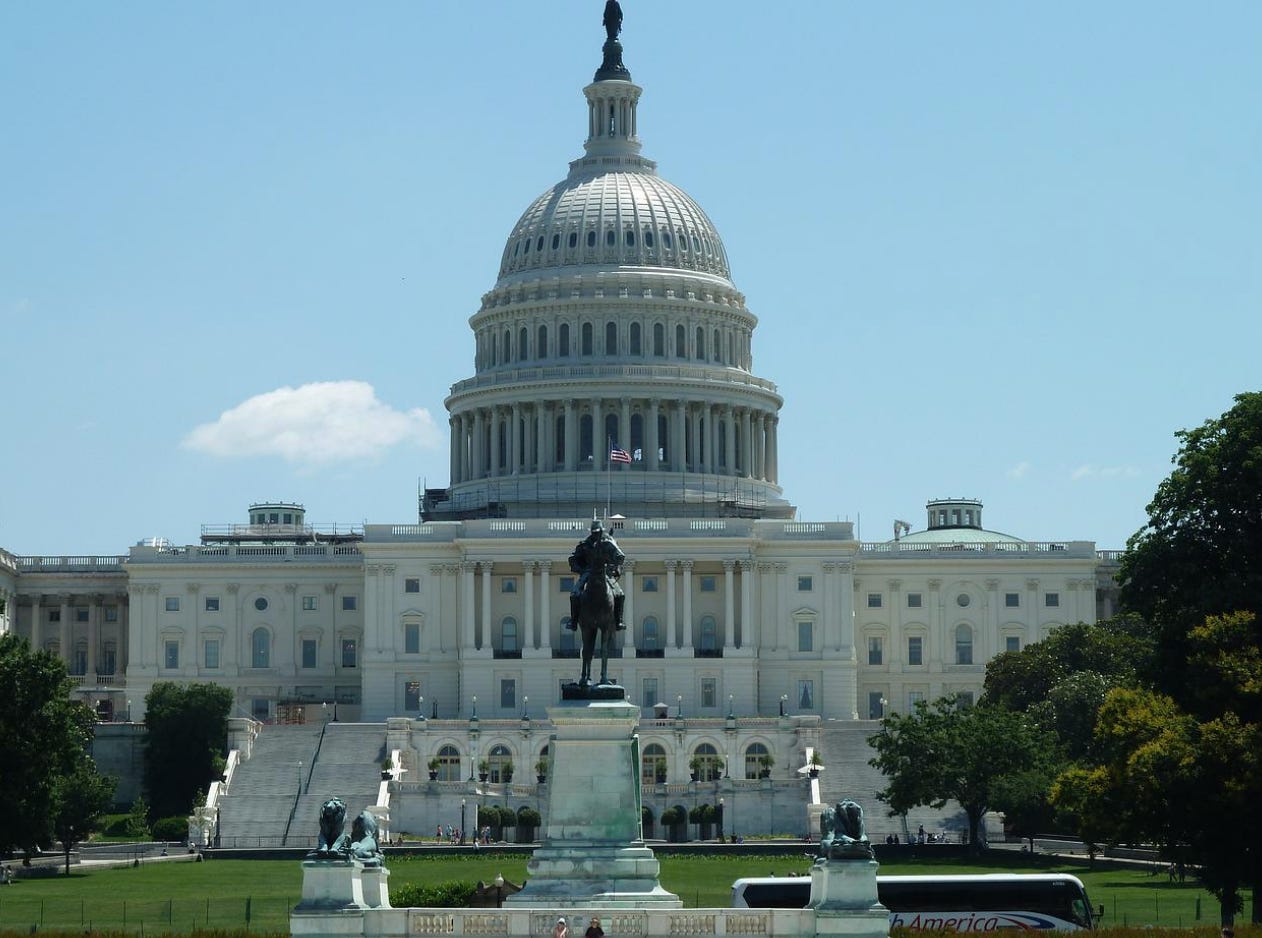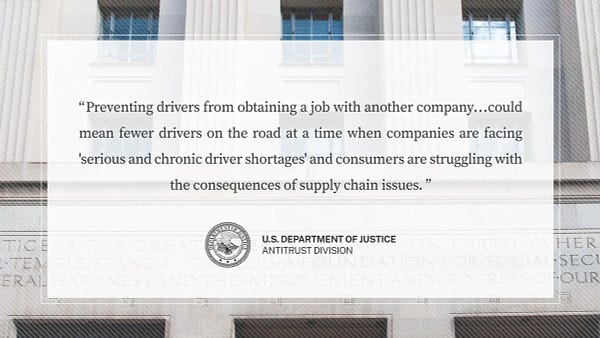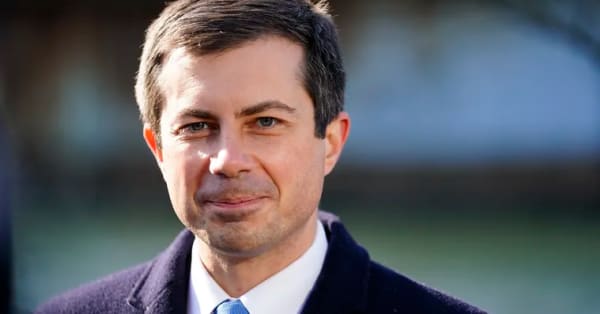The Pete Buttigieg Fake Governing Problem
Biden antitrust enforcers and bank regulators are cracking down on the powerful. Pete Buttigieg is doing the opposite. This administration is a contest between real governing and fake governing.
Welcome to BIG, a newsletter on the politics of monopoly power. If you’d like to sign up to receive issues over email, you can do so here.

The United States of Cheating
Late last month, the Wall Street Journal reported a story on how Ernst and Young was penalized for helping some of its auditors cheat on a required ethics exam. Auditing is the policing of accounting, which is the very language and guts of American business. As accounting sleuth Francine McKenna wrote, it is “incredibly depressing to see the depth and breadth of the corruption at the global audit firms over and over again.” I’d go further - that there is systemic manipulation of auditing standards is a very bad sign for the ability to make things we need. It also points to what I think is the basic problem in American society, which is that most of our elite institutions are increasingly dedicated to cheating people.
The reality is that our industrial systems are breaking down because our government isn’t constraining the powerful people who run them according to short-term profit maximizing goals. That’s why the airlines, for instance, are a mess. Despite consumer complaints about the industry being up 300% since 2019, and $5-15B of tickets that went un-refunded during Covid, the airlines are unchastened. And the reason is that Secretary of Transportation Pete Buttigieg has created an environment ripe for cheating by having his agency issue a record low number of aviation enforcement orders.
The DOT’s most significant action over airlines refusing to refund tickets on canceled flights - which they are legally obligated to do - was a $2 million fine in 2021 against Air Canada, which the Department issued because the airline openly said it wouldn’t adhere to the law. After announcing a $25 million amount and getting lots of headlines for being ‘tough,’ the DOT then negotiated it down to $2 million of cash owed, and just half of that immediately (the rest after a year). The amount was so low Air Canada didn’t have to report the fine to investors. Yet Buttigieg is out there on TV bragging about his record fines against airlines. He also said, sternly, they concluded ten separate investigations on refunds, while neglecting to mention there were no results from those investigations.
Airlines are so confident in their control of the political sector that they even canceled flights that Buttigieg himself was scheduled to take, a veritable wedgie given to the substitute teacher. What this means for the industry is that airline executives understand they can structure a market around cheating, and nothing will happen to them.
So that’s fake governing. Yet there is real governing going on, if you know where to look. To understand what it would mean to govern, I want to highlight a few recent examples that veer towards addressing the culture of cheating.
How to Actually Govern
The airlines cheated people during the initial stages of the pandemic, but so did banks. Bank of America, for instance, froze people’s accounts who were getting unemployment help. But unlike with airlines, there is a real regulator on consumer protection for banks - the Consumer Financial Protection Bureau Director Rohit Chopra. And the CFPB forced Bank of America to refund customers, and on top of that fined the bank $100 million for “botching the disbursement of unemployment insurance.” Another bank regulator followed the CFPB and issued a separate $125 million fine. The difference between Chopra and Buttigieg is stark.
Another example is Chopra forcing banks to cover fraudulent payments on real-time money transfer services like Zelle, and the financial services industry is squealing in protest that Chopra is seeking to destroy the economy. But they shouldn’t be whining about this choice. One reason consumers are comfortable using credit cards is because there are anti-fraud rules with such cards, and if there’s a problem the bank has to deal with it. This regulatory choice - made in the 1970s - fostered an industry in which banks ensured that there were anti-fraud and security measures in place. Now credit cards are a profit center for banks. Solid regulatory choices foster quality trusted commercial systems, but that starts with clear rules that everyone - including the powerful - must adhere to. That’s how you govern.
There are also quieter levers useful to governing. There’s a lot of carping about bad judges of late, and for good reason. But enforcers can also shape how judges think about the law. For instance, the Department of Justice Antitrust Division, run by anti-monopolist Jonathan Kanter, just issued a ‘statement of interest’ in a private lawsuit opposing trucking firms that agree with one another not to hire truckers from each other. The Antitrust Division not only enforces the law directly, but shapes the law through these kinds of briefs. Kanter is trying to create a legal prohibition against these ‘no-hire’ agreements. It isn’t flashy, it isn’t instant, but it restructures markets.


The Antitrust Division also just filed a statement of interest in a lawsuit against elite and Ivy League schools such as Columbia, the University of Chicago, and Duke University for price-fixing over financial aid, as well as filing one trying to narrow the antitrust exemption in baseball over labor disputes. With these statements, Kanter is using a key tool to influence how the judiciary sees the problem of wages and corporate power, as well as higher education. It’s not the same thing as litigating, which Antitrust Division is doing in a high-profile merger over Penguin buying Simon & Shuster.
But it matters, because governing well means shaping the details of the law and making sure the powerful adhere to it.
Woe to Democrats
And with that, let’s talk to the politics. As the midterm elections approach, there’s a wide-ranging debate within elite Democratic circles about what Biden has done wrong, and more broadly what has gone wrong within the party structure since the Obama administration. Adam Jentleson, a long-time operative, has laid out an argument that it was the large well-funded nonprofit advocacy groups who structurally were unwilling to wield power. Such an argument is raging on the right as well. Indeed, both political parties are in identity crises.
The problem among Democrats is obvious, and it is that the party rewards people like Buttigieg. Here, for instance, is how the Presidential chatter is going in certain quarters of the media.


I like Bunch, and I don’t mean to pick on him. It is a common theme to promote Buttigieg as a contender, because there is simply no perceived relationship in the Democratic Party apparatus between governing and the act of doing politics.
And this goes back decades. Virtually no Democrat or advocacy group on the Democratic or left side of the aisle noticed Obama didn’t govern well at the time he was in power. They offered fake criticisms, like he wasn’t strategic or bold, but not that he actually governed poorly and should have lost his reelection campaign in 2012 due to his policy choices.
Indeed, Obama is extremely popular today. Powerful people nostalgically look back at his White House as an era they could do whatever they wanted and feel good about it. Even today, no one with a megaphone on the left has an incentive to note he was a bad President, and the primary voters themselves are deeply hostile to this notion. So like the airlines who know that they can cheat in a regulatory environment conducive to cheating, Buttigieg is a candidate who governs disastrously in an environment that is politically conducive to disastrous governance.
He can go on TV and talk about social issues or him taking parental leave, and because he didn’t upset anyone who is powerful, he will be able to become a Governor, Senator, or perhaps a higher status office. That’s what the political trade sheets like Politico suggest, and it’s consistent with how Democrats rewarded Obama.
But this fake governing strategy has brutal costs overall. There’s an inchoate sense of chaos, but rather than pointing the finger at people like Buttigieg throughout the government who can’t and won’t govern, Democrats argue that the situation is out of the control of any human being (weather! Covid! globalization! Ukraine!), or that the Bad People on the Right are the problem. Buttigieg’s strategy of not running the airline system well in hopes his own side’s voters and advocacy groups won’t notice destroys the ability of Democrats to make the case they know how to run the government. Because they don’t.
More broadly, the political dynamic of refusing to judge high officials based on whether they are doing their job in government creates a severe political problem for democracy itself, as voters lose faith that politics is anything but a social game for media and political elites. It doesn’t have to be that way, and voters will eventually either elect people who govern to constrain the powerful, or they will tire of democracy altogether. We’ve seen this movie before, and those are the two ways it usually ends.


I wish this wasn't happening again...People being impressed with shiny Hollywood "public relations" package Obama style. This man is all ambition. He is getting away with the latest public relations ploy which is the social elevation of two fathers having a baby. How sensitive, how nice and aren't we all so tolerant and good...but there is no real discussion of anything including his conduct while being Mayor Pete. It is all kept very banal and superficial. Why would anyone be impressed with his six
languages when he nothing of value to say in his first language English. (I'm probably out of line)
I spent the first few years in DC as a budding lobbyist for the airline industry in the 1980's, "The Partnership for Improved Air Travel" co-chaired by Bob Crandall of American and Herb Kelleher of Southwest. Our purpose was to lobby for more runways, more capacity, more competition. We were a waste of money. I did not get rich but soon found other clients. The airlines soon learned that the road to solvency and profits was LESS capacity, less runways and less competition. There were something like 12 real national airlines then, today there are 4 and half the hubs.